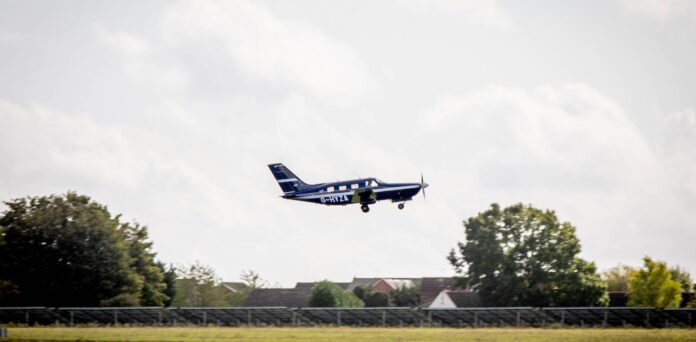LONDON: An experimental plane powered by hydrogen fuel cells has successfully taken off on a short flight from a British airfield.
The six-seat Piper Malibu plane completed a 20-minute flight from Bedfordshire, near London, that could eventually pave the way for decarbonizing small passenger aircraft. ZeroAvia, the company which developed the plane, will next work on a zero-emission craft capable of flying up to 400km by the end of the year.’
It could lead to green routes on short-haul flights such as Los Angeles-San Francisco or Bonn-Berlin.
“What we’re doing is replacing fossil fuel engines with what’s called hydrogen-electric engines,” ZeroAvia founder and chief executive Val Miftakhov said.
“We also have a fuelling infrastructure set up that ensures zero-emission production of hydrogen itself.”
The hydrogen plane, which only emits water vapour, was developed as part of the HyFlyer scheme supported by a grant from the British government. ZeroAvis said it was the first time a commercially available aircraft has taken to the skies using hydrogen power.
Business and industry minister Nadhim Zahawi said: “Developing aircraft that create less pollution will help the UK make significant headway in achieving net zero carbon emissions by 2050.
To achieve this, manufacturers must rely on improved airport infrastructure around the world as well as perfecting greener technology.
“It’s not just a question of putting hydrogen-based aeroplanes [in the air] and getting them to work,” said aviation safety investigator David Gleave. “We have to work out how to refuel these aeroplanes because existing infrastructure won’t work. We have to work out other things such as the fire and rescue requirements for the aeroplane, so there’s quite a lot of work to do but certainly, it’s very exciting going forward.”
British Prime Minister Boris Johnson said that he wanted to see a “green industrial revolution” that helped the wider economy, which has been badly hit by the coronavirus pandemic. “We want to be the Saudi Arabia of wind,” he said. “We want to lead in carbon capture and storage, a technology I barely believed was possible but I’m now a complete evangelist for.”
Johnson said hydrogen potentially had a key role to play in propelling transport in the future.
“We want to use those technologies to develop a lot of hydrogen,” he said. Airbus, the world’s biggest plane manufacturer, is considering three designs for hydrogen-powered aircraft as it seeks to bring the world’s first emission-free passenger plane into service by 2035. The concepts include a turbofan jet with a capacity of 120-200 passengers that can fly 2,000 nautical miles (2,300 miles).




